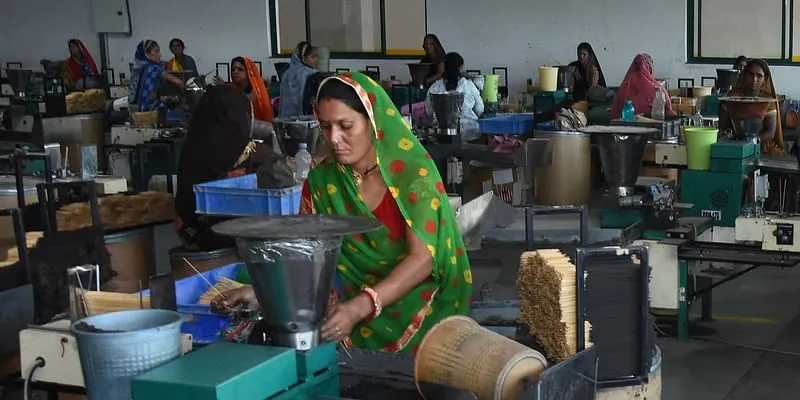[Sustainable Agenda] This initiative is making incense sticks out of flower waste
Mysore Deep Perfumery House (MDPH), with its flagship brand Zed Black, has partnered with HelpUsGreen, a flower recycling technology company, to launch Nature Flower fragrant incense sticks made from recycled flowers.
Flowers form an integral part of religious or social events globally — be it in a temple, gurdwara, mosque, or weddings and funerals.
However, a large volume of flower waste generated daily is improperly disposed of in landfills, or in many cases, in water bodies, causing foul smells and polluting the area.
On the brighter side, flowers contain adequate nutrients and other lignocellulosic materials, which can be utilised for various purposes.
Efficient waste management — recycling, reusing and recovering — is key to the sustainable development of any society.
And, — an agarbatti manufacturer with its flagship brand Zed Black — and HelpUsGreen, a flower recycling technology company, have partnered to launch incense sticks made from recycled flowers.
From floral waste to fragrant sticks, the Zed Black Nature Flower incense sticks come in four natural fragrances — sandalwood, mogra, kasturi, and rose. The joint project aims to impact the lives of over 1,000 indigenous women by generating employment for them.

Zed Black Nature Flower incense sticks made from recycled flowers
Working together
Ankit Agrawal, Managing Partner, MDPH (Zed Black), tells SocialStory, “Joining hands with HelpUsGreen and creating the agarbatti brand Nature Flower is our small contribution in reducing the floral waste from the holy places in the country. We are also creating a clean environment for the tourists and locals alike.”
Besides, the companies are also in talks with various municipal corporations to collect daily floral waste and wilted flowers.
Using its flower recycling technology, Kanpur-based HelpUsGreen is establishing a first-of-its-kind circular economic model in India and is leading the movement in keeping the environment clean, thereby decreasing carbon footprint in India.
MDPH and HelpUsGreen are working with about 25 places of worship, including temples, gurudwara, and mosques in Kanpur., and collect over 230 tonnes of flower waste each day.

Women workforce at the Zed Black - HelpUsGreen unit
After collecting flowers from various places, HelpUsGreen dries and sorts them and makes incense sticks from them. It sends these incense sticks to MDPH’s factories in Indore, which adds fragrance, packages and markets them.
“As an agarbathi brand with wide reach, we realised any company that comes up with a new concept, finds it difficult to market and make the product economically viable,” Anshul Agrawal, Managing Partner, MDPH (Zed Black), says.
He adds that its flagship brand Zed Black boasts of MDPH’s expertise in making incense sticks at the best price and marketing it effectively to reach the masses.
At present, MDPH and HelpUsGreen sell a pack of 10 Nature Flower incense sticks at Rs 12 per pack and a pack of 60 sticks for Rs 60. Besides selling on MDPH’s website, these incense sticks are also available on leading ecommerce portals like Amazon and Flipkart.
In fact, it is available in traditional retail stores and is exported to over 40 countries across six continents, including the US, Brazil, Ethiopia, Netherlands, Australia, and Malaysia.

Inside MDPH factory
According to Karan Rastogi, Founder of HelpUsGreen, since its incorporation in 2019, HelpUsGreen has "flower-cycled" 535 metric tonnes in FY 19-20, 1,460 metric tonnes in FY 20-21, and 1,752 tonnes of temple waste to date in FY 21-22 — saving over 3,474 metric tonnes of chemical pesticide from entering the Ganges.
It claims to have also impacted more than 245 livelihoods indirectly through the family members of each employee of the company (five members per family on average).
Brand awareness
Besides recycling discarded flowers, these companies also provide livelihood opportunities. MDPH and HelpUsGreen plan to set up various collection centres across India to create employment prospects for underprivileged women.
By the end of 2022, they aim to impact the lives of over 1,000 people. MDPH employs 3,500 people directly in its factories, with women comprising over 80 percent of the workforce.
However, one of the major challenges the companies faced was in educating and making people aware of the environment-friendly initiative. For this, they are setting up kiosks near places of worship to share statistics and photos of the recycling process.
Talking about the positive response from customers, Anshul says, “With this new range of Nature Flower incense sticks, made using flower recycling technology, it's an obvious choice for our customers who are concerned about the environment. We are also planning to do a roadshow in Indore, Kanpur, Mathura, Varanasi, and more in the near future to scale the product further so as create a wider impact for the cause.”
Edited by Suman Singh

![[Sustainable Agenda] This initiative is making incense sticks out of flower waste](https://images.yourstory.com/cs/5/79900dd0d91311e8a16045a90309d734/MHDPfeat-1644412342864.jpg?mode=crop&crop=faces&ar=2%3A1&format=auto&w=1920&q=75)
![[Sustainability Agenda] This 12-year-old’s NGO has recycled over 1.5 lakh batteries to make Earth a better place](https://images.yourstory.com/cs/5/79900dd0d91311e8a16045a90309d734/sntfeat-1642649094487.jpg?fm=png&auto=format&h=100&w=100&crop=entropy&fit=crop)





